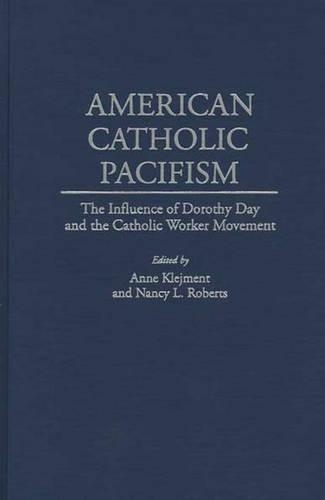
American Catholic Pacifism: The Influence of Dorothy Day and the Catholic Worker Movement
(Hardback)
Publishing Details
American Catholic Pacifism: The Influence of Dorothy Day and the Catholic Worker Movement
By (Author) Anne Klejment
Bloomsbury Publishing PLC
Praeger Publishers Inc
25th November 1996
United States
Classifications
Tertiary Education
Non Fiction
Christianity
Religious social and pastoral thought and activity
Theology
Political ideologies and movements
Peace studies and conflict resolution
261.87308822
Physical Properties
Hardback
224
Description
This collection of mostly original essays by scholars and Catholic Worker activists provides a systematic, analytical study of the emergence and nature of pacifism in the largest single denomination in the United States: Roman Catholicism. The collection underscores the pivotal role of Dorothy Day's Catholic Worker movement in challenging the conventional understanding of just-war principles and the American Catholic Church's identification with uncritical militarism. Also included are a study of Dorothy Day's preconversion pacifism, previously unpublished letters from Dorothy Day to Thomas Merton, Eileen Egan's account of the birth and early years of Pax, the Catholic Worker-inspired peace organization, and in-depth coverage of how the contemporary Plowshares movement emerged from the Catholic Worker movement.
Reviews
"A superb collection of articles and letters by distinguished scholars and leading activists. Beginning with World War I and concluding with the nuclear crisis of our own time, it illuminates key events in the history of the Catholic Worker movement, thereby providing important insights into the development of Catholic pacifism and the broader peace movement. All persons concerned with spiritual meaning and human survival will find it of great value."-Lawrence S. Wittner, Professor of History State University of New York at Albany
"The editors bring together a wonderful set of essays on a subject often asserted but rarely examined seriously.... First-rate scholars provide new information on neglected aspects of the Catholic peace movement during World War II, the Cold War, and Vietnam. Others assess the significance of the Catholic wing on the wider peace movement. Presentation of the correspondence of Dorothy Day and Thomas Merton is the frosting on a rich cake of historical writing. A superb book for scholars and general readers interested in religion and public life and in the developing conscience of Americans on matters of war and violence."-David J. O'Brien, Loyola Professor of Roman Catholic Studies College of the Holy Cross
"This is crucial reading for all students of social change. My experience as a college teacher is that the educational system in America has worked almost perfectly. The students, with few exceptions, are totally ignorant of the history of dissent in America. This book profoundly illuminates the seminal role played by Dorothy Day and the Catholic Worker not only in the Church, but in the broader peace and justice movement."-Marv Davidov, adjunct teacher St. Thomas University and St. Cloud State University Founder, The Honeywell Project
The essays here document the sources, origins, and consistent pacifism of the Catholic Worker, placing it in the context of the broader American pacifism scene and Catholic pacifism internationally....Runkel's archival guide is invaluable.-Choice
"The essays here document the sources, origins, and consistent pacifism of the Catholic Worker, placing it in the context of the broader American pacifism scene and Catholic pacifism internationally....Runkel's archival guide is invaluable."-Choice
Author Bio
ANNE KLEJMENT is Professor of History at the University of St. Thomas. NANCY L. ROBERTS is Professor of Journalism and Mass Communication at the University of Minnesota. She graduated from Swarthmore College in 1976.
